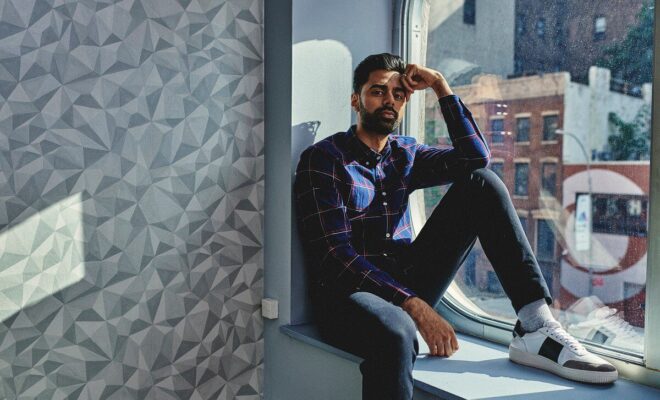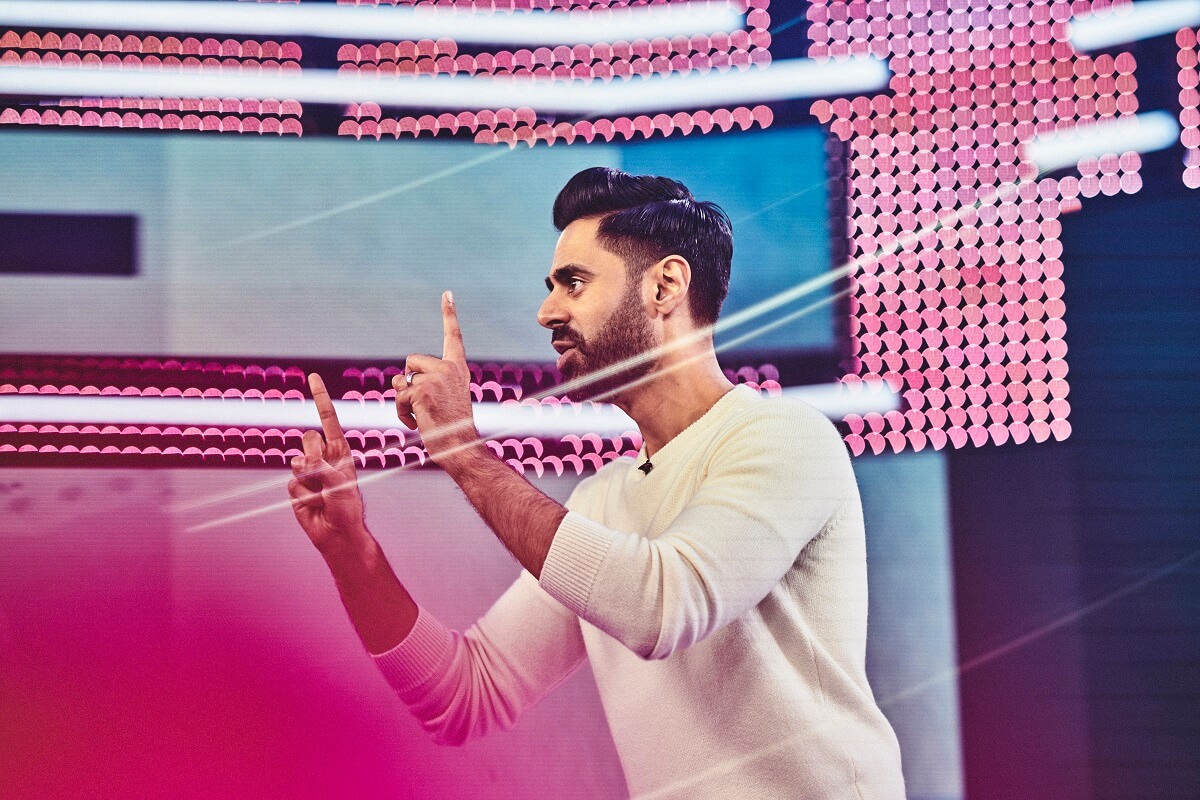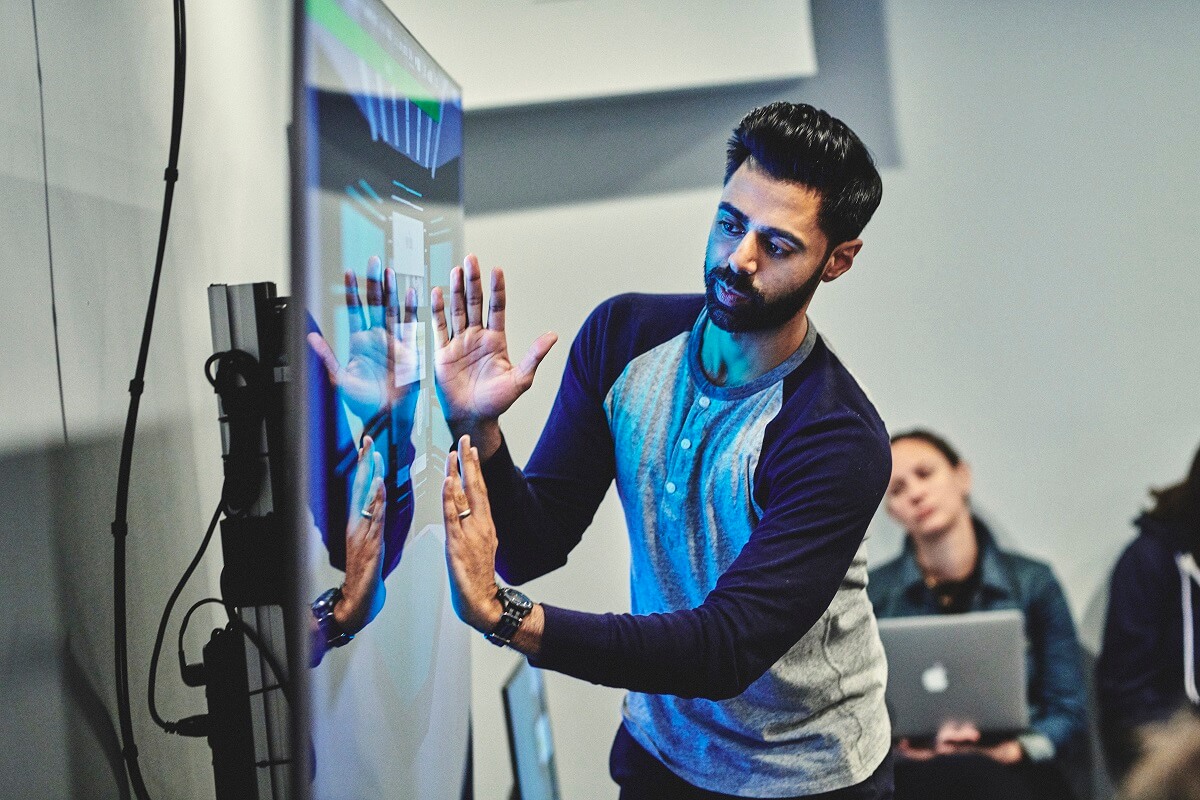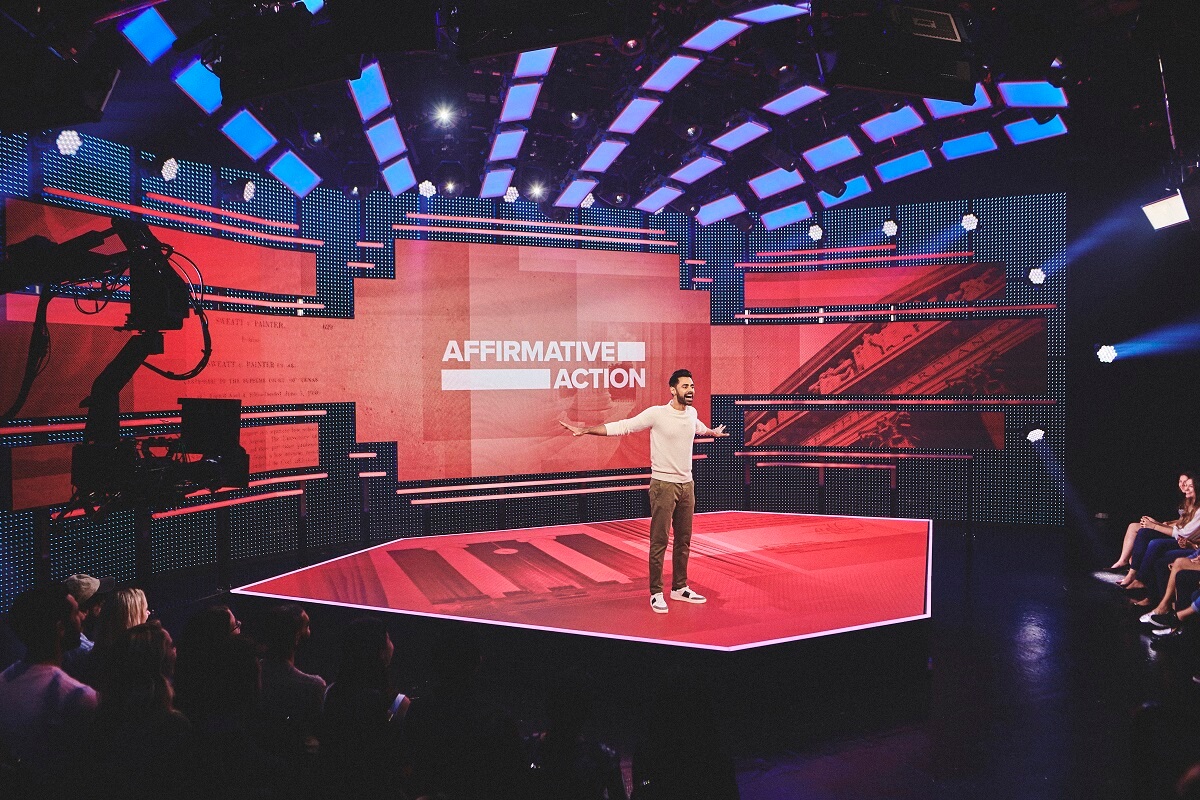Arts
Can Hasan Minhaj Make Topical Comedy Work on Netflix

Comedian Hasan Minhaj at the offices of "Patriot Act," his new weekly satirical news show that debuts on Oct. 28, 2018, on Netflix, in New York, Sept. 27, 2018.
Photo: Bryan Derballa/The New York Times)
Minhaj’s comedy peers believe that he has as good a shot as anyone at finding a new approach to this well-worn genre.
Standing on the set of his new Netflix series, “Patriot Act,” one evening earlier this month, Hasan Minhaj asked his studio audience if they had any questions about what they were about to see. He knew that his stage, an immense digital screen encircling the diamond-shape platform he was standing on, was a bit of a technological monstrosity — “it’s like if Michael Bay directed a PowerPoint presentation,” he joked to the crowd — and so some clarification might be required.
Sure enough, someone asked: “What is this?”
Minhaj, 33, a lean, energetic stand-up and a recent alumnus of “The Daily Show,” explained that “Patriot Act” (whose first two episodes will be released on Oct. 28) was a project he had been developing for more than two years.
Before the success of his stand-up special “Homecoming King” and his incisive turn as host of the 2017 White House Correspondents Dinner, he said he’d already been thinking about applying his comedic style to news stories that weren’t necessarily at the center of everyone’s attention, in a format that didn’t look like another cookie-cutter late-night comedy.
The test show that Minhaj was about to perform — a 24-minute monologue about the role of Asian-Americans in reshaping affirmative action, and a 10-minute piece about digital security in Estonia — could very well end up looking like a “woke TED Talk,” he said.
Good or bad, it was the show he always wanted to make and “I’m going to give you everything I have,” Minhaj said.
He added, “Culturally, for us, I think we need something like this.”
“We” here could mean the racially diverse group that had come to see Minhaj, who often talks in his act about his identity as a Muslim and a child of Indian immigrant parents. It could refer to the demographic of viewers in their 20s and 30s that Netflix would love to see him bring to the streaming service. Or it might be anyone who has tired of “Daily Show” clones and is eager for anything even slightly different.
But even if Minhaj and his colleagues have cracked the code and created a genuinely new kind of topical comedy, is there an audience for it? And is Netflix the place where it belongs?
If the post-Jon Stewart era of television once looked like a potential paradise for any host with a political perspective and a few zingers about the Trump administration, it is now a battlefield littered with casualties.
While hosts with established identities — sharp wits like Stephen Colbert and Samantha Bee, or John Oliver and Seth Meyers, known for their long, researched takedowns — have become increasingly entrenched, newer entrants have stumbled. In two years, Comedy Central has canceled two 11:30 p.m. programs intended as companions for “The Daily Show”: “The Nightly Show With Larry Wilmore” and “The Opposition With Jordan Klepper.” BET gave only one season to its late-night series “The Rundown With Robin Thede.”
Netflix, despite its rapid expansion in other traditional TV categories, has struggled to create this kind of appointment viewing. Last year it canceled its first high-profile attempt at a topical talk show, “Chelsea,” hosted by Chelsea Handler, and this past August, it lowered the boom on two weekly programs, “The Joel McHale Show With Joel McHale,” which debuted in February, and “The Break With Michelle Wolf,” which started in May.

Comedian Hasan Minhaj on the set of “Patriot Act,” his new weekly satirical news show debuting Oct. 28, 2018, on Netflix, in New York, Oct. 9, 2018. Photo: Bryan Derballa/The New York Times)
Maybe there’s no way for topical comedy to succeed on streaming TV and maybe Minhaj is doomed before he starts. But Minhaj doesn’t see it this way.
“If we get this wrong, well, it’s what everyone predicted,” he told me a few days before the test show. “But if we get this right?” His eyes widened and a grin spread across his face. “It feels like ‘Rocky’ 1 all over again.”
On an earlier morning in September, Minhaj and about 20 of his “Patriot Act” colleagues were in the bowels of their midtown Manhattan office, gathered around an enormous TV (and a basket of croissants) for what they called a “pre-viz” meeting.
The monitor showed a computer rendering of the “Patriot Act” stage, on which stood a small digital silhouette of Minhaj. The flesh-and-blood comedian was sitting on a couch, dressed in athleisure clothes and a pair of Air Jordans as he read from the script for his affirmative action monologue.
At a breakneck clip, he narrated the story of Edward Blum, the conservative activist and president of Students for Fair Admissions, which is suing Harvard University for allegedly discriminating against Asian-American applicants.
On screen, bar graphs rose and fell like roller coasters and pie charts exploded into existence while Minhaj recited admissions figures for elite colleges. (Noting that Caltech had nine black students in 2012, he quipped, “There are more black people in the Wu-Tang Clan.”)
Amid the deluge of data and punch lines, Minhaj was also weaving a personal story: one of growing up a proud first-generation American in Davis, California, while navigating a murky ecosystem of race and class.
In his college-prep classes, Minhaj said, he was told not to declare himself an Asian on his application forms or he’d risk the penalty of a possible racial quota.
“I thought I wasn’t going to get into Stanford because some black kid was going to take my spot,” he said in the monologue. “But I didn’t get into Stanford because I was dumb.” (This is his modest way of saying he cracked 1300 on his SAT exam.)
On paper, Minhaj is very much a grown-up: a husband of three years to his wife, Beena, a management consultant, and father to their daughter, who was born in March. But in person, he has a childlike buoyancy, kept aloft by his lifelong loves of hip-hop and professional basketball and his occasional tendency to talk like an internet meme come to life. He’ll say aloud a phrase like “tools—>clear history” when he means he’s trying to put something out of his mind.
In late 2014, he was hired as a “Daily Show” correspondent. “He was just undeniable,” Jon Stewart said of him. “I can teach the false-news correspondent mechanics, but not the singularity of someone’s talent. When you get somebody like that, who’s a great storyteller, introspective and humble, you just go: ‘OK. We’re done. He’s good.’”
Only a few months later, Stewart announced his departure from the program. Minhaj said he couldn’t forget his admired boss’ explanation for why he was leaving: “Jon was like, ‘I’ve manipulated this chess piece in every single way I could. There’s no further place that I can take it.’” The message to Minhaj was clear, even then, that he had to start thinking about his own next moves.
When Trevor Noah took over at “The Daily Show,” Minhaj was seen as something of a curiosity there. “Hasan was intrinsically different from all of the caricatures and archetypes of what ‘Daily Show’ correspondents had been,” Noah told me. “He wasn’t snide, he wasn’t sarcastic — he was just a different person.”
Minhaj appeared in recurring features like “Brown in Town,” where he reported on stories outside New York, and “Hasan the Record,” in which he answered burning questions — say, “What is impeachment?” — in pretaped segments edited at a pace apparently intended to induce seizures.
His breakout opportunities arrived elsewhere. First was his one-man show, “Homecoming King,” which he started performing live in 2014 and released as a Netflix special last year. It is his exuberant recitation of his origin story, of learning the ropes from his father (while his mother studied at medical school in India) and confronting bias and bigotry in America.
“Homecoming King” also established a signature visual style for Minhaj’s stage show, full of vivid digital graphics and screencaps from social media. It led to his invitation to host the White House Correspondents Dinner at perhaps the worst possible moment, when President Donald Trump had already announced he would not attend, media organizations were questioning whether the event should even go forward and Minhaj said he knew the gig was “radioactive.”
“How far down the totem pole do you have to go to be like, ‘Let’s get the second- or third-most popular correspondent on ‘The Daily Show’?’” he said.
Minhaj knew that he’d been underestimated and he used this to his advantage. He delivered a stirring routine that was less a taunting of Trump officials than a reminder to the journalists watching of the weighty responsibility facing them.
“In the age of Trump,” he said in his speech, “I know that you guys have to be more perfect now more than ever. Because you are how the president gets his news.”
He added: “You can’t make any mistakes. Because when one of you messes up, he blames your entire group. And now you know what it feels like to be a minority.”
Looking back on the experience over lunch at a Greek restaurant near his office, Minhaj told me this was a pivotal career moment, not because he got good reviews or because he resisted the advice of fellow comedians who told him he had to (metaphorically) burn the room down.
What he learned that night — though he’d already suspected as much — was that he wasn’t a slinger of one-liners so much as a designer of narratives. “I want to be surgical,” Minhaj said. “I want to build to a moment.”
When Netflix pursued him, in the afterglow of the White House Correspondents Dinner, to create a series for them, Minhaj had a very clear sense of what he didn’t want to do.

Comedian Hasan Minhaj during a “pre-viz” meeting for his new show “Patriot Act” in New York, Oct. 10, 2018. With “Patriot Act,” the former “Daily Show” correspondent plans to cover news most late-night hosts ignore, and looks to defy Netflix’s spotty talk show track record. Photo: Bryan Derballa/The New York Times
He took out his phone and showed me a series of photos from other late-night shows — all the hosts you’d expect — seated at their desks in identical poses with graphics placed in identical locations above their shoulders.
His voice was uncharacteristically ferocious as he swiped through the photos. “It. Doesn’t. Matter. The. Network. It all. Stays. The same. I swear. To. God,” Minhaj said.
If he didn’t assert himself and find his own approach, he said, “I was going to be in a suit, behind a desk, in front of a fake city skyline, and people would be, like, ‘Oh, it’s Indian John Oliver.’”
In their international travels, Minhaj and his collaborators were seeing “Homecoming King” and his correspondents dinner performance connect with a global viewership.
Prashanth Venkataramanujam, a fellow comedian and longtime friend who worked with Minhaj on these routines, said they began to devise a plan for tapping into this underrepresented audience.
“How do we talk about subjects that just don’t normally make it into the mainstream conversation?” he said. “We have the ability to find a thesis and then work our way backwards from it.”
The news stories he should focus on, Minhaj said, were the ones in which he felt some sense of personal investment. “Not, do I have a take?” he said. “But do I have the best take? I have no desire to be the 19th hyena jumping on the carcass. Do I have something of value to add? Then let’s do it.”
Over a period of months, Minhaj workshopped some routines (like the one about affirmative action) at the Fat Black Pussycat in Manhattan. He spent his own money to produce a proof-of-concept video for “Patriot Act” — essentially, a rough pilot episode that he could show to Netflix and other broadcasters.
It closely approximates how Minhaj intends to present “Patriot Act” now: with him always standing and in perpetual motion — no desk to sit behind, no chair to sit on — surrounded at all times by graphics, data and video.
Bela Bajaria, who is Netflix’s vice president of content, said that when she first spoke with Minhaj, he told her he wanted to wait until he had a very clear sense of his vision. “I didn’t actually know what that meant,” Bajaria said. “I figured he’d come back with this really great pitch.” When he showed her the proof-of-concept video, Bajaria said her response was, “Let’s do that show.”
Netflix ordered 32 episodes of the series, which will be released in cycles of six to eight weekly episodes. Even now, in the days before its first episodes are released, Minhaj was still deciding whether one long monologue was enough content for an entire show or if viewers would also want another shorter, less substantive segment (a “wine pairing” to go with their “steak,” as he put it).
Minhaj’s comedy peers believe that he has as good a shot as anyone at finding a new approach to this well-worn genre. But no one is in denial about the challenges he faces, either.
“You never know what’s going to hit and what’s not going to,” Jon Stewart said, but when it came to Minhaj, “I’d buy that raffle ticket any day of the week.”
Though other recent shows with promising hosts had been short-lived, Stewart said, “I don’t think it says anything about the talent of the individuals. If you told me, ‘I’m going to let Jordan Klepper or Robin Thede or Michelle Wolf do what they do,’ I’d be like, ‘Yeah, that’s a smart choice.’”
He added, “I hate to see things get pulled before they’ve fully developed their voice and figured out who they are, and I thought they all showed a worthiness to continue. But that’s why I’m not a network executive.”

Comedian Hasan Minhaj on the set of “Patriot Act,” his new weekly satirical news show debuting Oct. 28, 2018, on Netflix, in New York, Oct. 9, 2018. Photo: Bryan Derballa/The New York Times
Larry Wilmore, the longtime “Daily Show” correspondent and former “Nightly Show” host, said he wondered if the audiences for these comedy shows had already made their choices and their viewing habits were fixed in place.
“There is just a lot of that type of content out there,” Wilmore said. “There are already trusted outlets for it. They’re home cooking for a lot of people.”
In an oversaturated market, Wilmore said, audiences would be won not by pioneering formats but memorable personalities, and he certainly considered Minhaj to be such a performer.
“The people who are coming to his shows are doing it in exhilaration — ‘Finally, somebody like us is doing this,’” he said of Minhaj. “I think that’s very meaningful.
Robin Thede, the former “Nightly Show” head writer and host of “The Rundown,” said that there was still ample room for a show that did not focus on the day-in, day-out spectacle of the Trump presidency. “I think people are tired of hearing about Trump,” she said. “Whether you’re for Trump or against Trump, everyone’s exhausted.”
Achieving diversity in the field is still a crucial goal, Thede said: “At the end of the day, there’s still at least three men who were born with the name James who host late-night shows.”
But broadcasters also have to recognize the long-term commitments required to make these programs viable.
Sarah Silverman, whose Hulu series, “I Love You, America,” is a rare topical comedy that is thriving on a streaming platform, said that TV shows are getting “less of a chance to develop — especially in a genre like this one that absolutely must have at-bats to find itself and succeed.”
She added, “Any talk show needs a couple years to find their voice but a lot of places can’t afford that luxury. It’s all niche, really.”
To many viewers, the very idea of a comedy show drawn from news and events happening right this moment seems to contradict the fundamental proposition that streaming platforms are offering.
“The whole point is that they liberated us from appointments,” Noah said. “It’s like McDonald’s saying, ‘Hey, would you like to wait 30 minutes for your food?’”
Netflix still aspires to have its own breakthrough topical comedy series. “We’d like to aspire to be best in class in programming, in every category,” Bajaria said. With a sardonic chuckle, she added, “And we do like a challenge.”
She pointed to shows like Jerry Seinfeld’s “Comedians in Cars Getting Coffee” and David Letterman’s “My Next Guest Needs No Introduction” — both hosted by monolithic entertainers — as examples where Netflix had innovated in the category.
But she acknowledged there were still challenges in selling Netflix viewers on these shows. “We’ve spent all this time saying, ‘Come at any point to the platform, watch whenever you want,’” Bajaria said. “In this category, we’re saying there’s a timeliness and trying to drive viewers on a weekly basis, which is different.”
The abrupt, 10-episode run that Netflix gave Michelle Wolf — another “Daily Show” veteran with a recent, much-discussed turn at the dais of the White House Correspondents Dinner — would seem like a bad omen for Minhaj.
But Bajaria said each series is its own proposition. In the case of “The Break With Michelle Wolf,” she said, “There’s a lot of factors that we take into consideration, obviously, when we’re not renewing a series. It didn’t find as large of an audience as we would have hoped. She’s very talented and we hope she felt really supported, making the show she wanted to make.” (Wolf declined to comment for this article.)
Netflix is hoping that Minhaj’s ethnicity and his personal compass for news stories will help him reach viewers in the other 190 or so countries outside the United States where it is offered, and it plans to promote the show heavily on YouTube and social media.
The success of “Patriot Act,” Bajaria said, would be measured by its viewership figures (which Netflix doesn’t make public) as well as its ability to insinuate itself into the zeitgeist (which no one has yet figured out how to quantify).
“Do you have something to say?” she said. “Do you have a fresh way to say this? We really think Hasan’s POV and his take on things can cut through.”
A short time after the “pre-viz” meeting, Minhaj was in his office at “Patriot Act,” his Air Jordans propped up on his desk near a Mike Bibby bobblehead. On a dry-erase board in front of him was a rough outline for an episode he hoped to perform about Saudi Arabia and its crown prince, Mohammed bin Salman. Attached to a corkboard behind him were notecards with other topics for future exploration: “Amazon and antitrust”; “Stand Your Ground”; “Myanmar/Rohingya.”
Minhaj said he was especially excited for a possible episode exploring the Carlyle Group, the private equity firm, and its $500 million investment in the Supreme streetwear brand; he called it a story of “hypebeasts and xenophobia.”
He had to make his choices shrewdly: every segment he commits to means months of work for his news research, writing and graphics departments, a staff of about 74 people total.
Minhaj said he was determined that “Patriot Act” not come out of the gate looking like “this open mic that Netflix is paying for as we figure it out.” He could still remember the day he learned that Wolf’s and McHale’s shows were both canceled and how it ratcheted up the pressure on his project.
As he recalled it, “Prashanth walked into my office and he could see that I was definitely stressed. He goes, ‘Remember, this is how you felt during the correspondents dinner.’ It’s this massive question mark — what is going to happen?”
At his test show a few weeks later, in a rare moment when he wasn’t feverishly delivering his affirmative action monologue or guzzling down gulps of water when the camera wasn’t on him, Minhaj paused to reflect on a joke he had told earlier.
He’d played a series of clips from interviews with Edward Blum, the conservative activist, in which he variously claimed that Harvard had a precise quota of 17, 19 or 15 percent for Asians in its incoming freshman class.
After the videos, Minhaj mocked Blum, telling him he should have studied harder at Kumon, the boot-camp education franchise that is especially popular with Asian immigrant families.
The line had got some laughter, and Minhaj was proud of that. He told the audience, “All the writers were like, ‘I don’t know if the Kumon joke is going to hit. It’s, like, so nerdy.’ I’m like, ‘Trust me — it’s going to hit.’”
And he was right. It was just one choice, but it was his choice and he was happy with it.
c.2018 New York Times News Service
